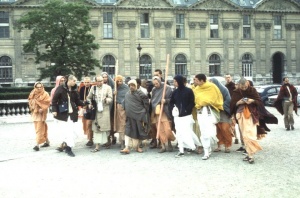SB 2.7.12: Difference between revisions
m (1 revision(s)) |
No edit summary |
||
| Line 1: | Line 1: | ||
{{info | {{info | ||
|speaker=Lord | |speaker=Lord Brahmā | ||
|listener= | |listener=Nārada Muni | ||
}} | }} | ||
[[Category:Srimad-Bhagavatam - Canto 02 Chapter 07]] | |||
[[Category:Bhagavatam Verses Spoken by Lord Brahma - Vanisource|020712]] | |||
<div style="float:left">'''[[Srimad-Bhagavatam]] - [[SB 2|Second Canto]] - [[SB 2.7: Scheduled Incarnations with Specific Functions|Chapter 7: Scheduled Incarnations with Specific Functions]]'''</div> | |||
<div style="float:right">[[File:Go-previous.png|link=SB 2.7.11]] '''[[SB 2.7.11]] - [[SB 2.7.13]]''' [[File:Go-next.png|link=SB 2.7.13]]</div> | |||
{{RandomImage}} | |||
==== TEXT 12 ==== | ==== TEXT 12 ==== | ||
<div | <div class="verse"> | ||
matsyo yugānta-samaye manunopalabdhaḥ | :matsyo yugānta-samaye manunopalabdhaḥ | ||
kṣoṇīmayo nikhila-jīva-nikāya-ketaḥ | :kṣoṇīmayo nikhila-jīva-nikāya-ketaḥ | ||
visraṁsitān uru-bhaye salile mukhān me | :visraṁsitān uru-bhaye salile mukhān me | ||
ādāya tatra vijahāra ha veda-mārgān | :ādāya tatra vijahāra ha veda-mārgān | ||
</div> | </div> | ||
| Line 16: | Line 22: | ||
==== SYNONYMS ==== | ==== SYNONYMS ==== | ||
<div | <div class="synonyms"> | ||
''matsyaḥ''—incarnation of the fish; ''yuga-anta''—at the end of the millennium; ''samaye''—at the time of; ''manunā''—the would-be Vaivasvata Manu; ''upalabdhaḥ''—seen; ''kṣoṇīmayaḥ''—up to the earthly planets; ''nikhila''—all; ''jīva''—living entities; ''nikāya-ketaḥ''—shelter for; ''visraṁsitān''—emanating from; ''uru''—great; ''bhaye''—out of fear; ''salile''—in the water; ''mukhāt''—from the mouth; ''me''—mine; ''ādāya''—having taken to; ''tatra''—there; ''vijahāra''—enjoyed; ''ha''—certainly; ''veda-mārgān''—all the Vedas. | |||
</div> | </div> | ||
| Line 23: | Line 29: | ||
==== TRANSLATION ==== | ==== TRANSLATION ==== | ||
<div | <div class="translation"> | ||
At the end of the millennium, the would-be Vaivasvata Manu, of the name Satyavrata, would see that the Lord in the fish incarnation is the shelter of all kinds of living entities, up to those in the earthly planets. Because of my fear of the vast water at the end of the millennium, the Vedas come out of my [Brahmā's] mouth, and the Lord enjoys those vast waters and protects the Vedas. | At the end of the millennium, the would-be Vaivasvata Manu, of the name Satyavrata, would see that the Lord in the fish incarnation is the shelter of all kinds of living entities, up to those in the earthly planets. Because of my fear of the vast water at the end of the millennium, the Vedas come out of my [Brahmā's] mouth, and the Lord enjoys those vast waters and protects the Vedas. | ||
</div> | </div> | ||
| Line 30: | Line 36: | ||
==== PURPORT ==== | ==== PURPORT ==== | ||
<div | <div class="purport"> | ||
During one day of Brahmā there are fourteen Manus, and at the end of each Manu there is devastation up to the earthly planets, and the vast water is fearful even to Brahmā. So in the beginning of the would-be Vaivasvata Manu, such devastation would be seen by him. There would be many other incidents also, such as the killing of the famous Śaṅkhāsura. This foretelling is by the past experience of Brahmājī, who knew that in that fearful devastating scene, the Vedas would come out of his mouth, but the Lord in His fish incarnation not only would save all living entities, namely the demigods, animals, men and great sages, but would also save the Vedas. | During one day of Brahmā there are fourteen Manus, and at the end of each Manu there is devastation up to the earthly planets, and the vast water is fearful even to Brahmā. So in the beginning of the would-be Vaivasvata Manu, such devastation would be seen by him. There would be many other incidents also, such as the killing of the famous Śaṅkhāsura. This foretelling is by the past experience of Brahmājī, who knew that in that fearful devastating scene, the ''Vedas'' would come out of his mouth, but the Lord in His fish incarnation not only would save all living entities, namely the demigods, animals, men and great sages, but would also save the ''Vedas''. | ||
</div> | </div> | ||
__NOTOC__ | |||
<div style="float:right; clear:both;">[[File:Go-previous.png|link=SB 2.7.11]] '''[[SB 2.7.11]] - [[SB 2.7.13]]''' [[File:Go-next.png|link=SB 2.7.13]]</div> | |||
__NOTOC__ | |||
__NOEDITSECTION__ | |||
Revision as of 17:37, 20 May 2021

A.C. Bhaktivedanta Swami Prabhupada
TEXT 12
- matsyo yugānta-samaye manunopalabdhaḥ
- kṣoṇīmayo nikhila-jīva-nikāya-ketaḥ
- visraṁsitān uru-bhaye salile mukhān me
- ādāya tatra vijahāra ha veda-mārgān
SYNONYMS
matsyaḥ—incarnation of the fish; yuga-anta—at the end of the millennium; samaye—at the time of; manunā—the would-be Vaivasvata Manu; upalabdhaḥ—seen; kṣoṇīmayaḥ—up to the earthly planets; nikhila—all; jīva—living entities; nikāya-ketaḥ—shelter for; visraṁsitān—emanating from; uru—great; bhaye—out of fear; salile—in the water; mukhāt—from the mouth; me—mine; ādāya—having taken to; tatra—there; vijahāra—enjoyed; ha—certainly; veda-mārgān—all the Vedas.
TRANSLATION
At the end of the millennium, the would-be Vaivasvata Manu, of the name Satyavrata, would see that the Lord in the fish incarnation is the shelter of all kinds of living entities, up to those in the earthly planets. Because of my fear of the vast water at the end of the millennium, the Vedas come out of my [Brahmā's] mouth, and the Lord enjoys those vast waters and protects the Vedas.
PURPORT
During one day of Brahmā there are fourteen Manus, and at the end of each Manu there is devastation up to the earthly planets, and the vast water is fearful even to Brahmā. So in the beginning of the would-be Vaivasvata Manu, such devastation would be seen by him. There would be many other incidents also, such as the killing of the famous Śaṅkhāsura. This foretelling is by the past experience of Brahmājī, who knew that in that fearful devastating scene, the Vedas would come out of his mouth, but the Lord in His fish incarnation not only would save all living entities, namely the demigods, animals, men and great sages, but would also save the Vedas.